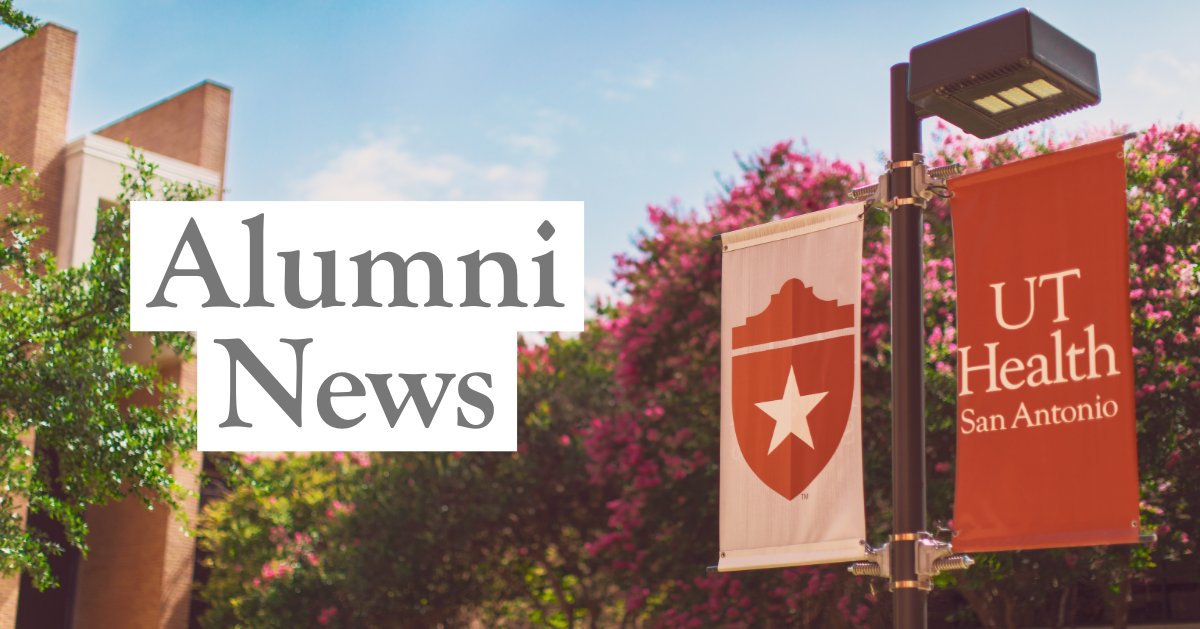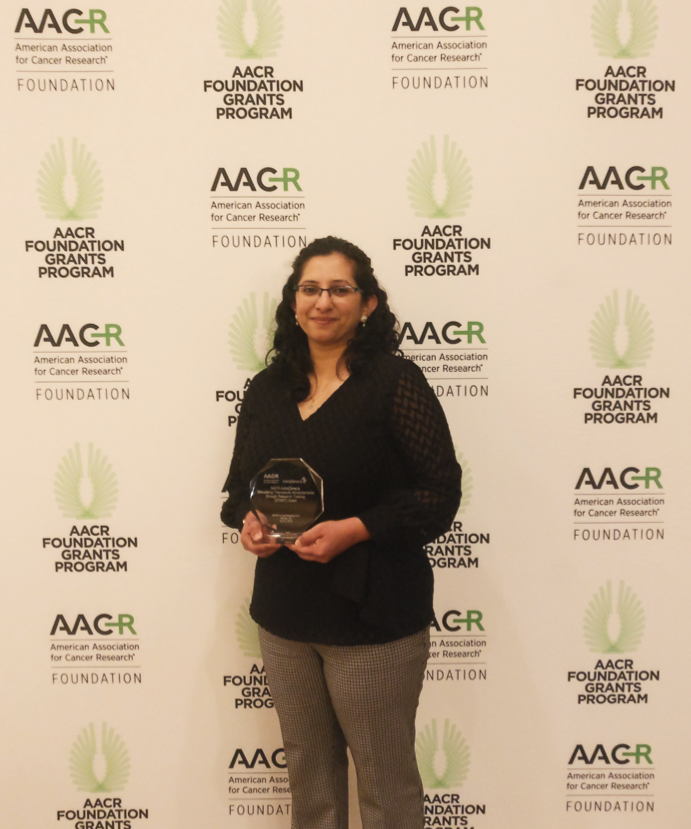Alumna Dr. Aparna Gorthi Receives AACR-AstraZeneca Stimulating Therapeutic Advances through Research Training Grant

Dr. Aparna Gorthi, was in the IMGP Cancer Biology track in Alex Bishop’s lab, graduated with her Ph.D. degree in August 2015. While in the program, Aparna was the recipient of the department’s Rennels Memorial Award for Excellence in Graduate Studies in 2013, an annual award that recognizes an academically outstanding graduate student halfway through their tenure in graduate school. Aparna also received a UT System Translational Science Training (TST) Across Disciplines Scholar Award through the IIMS in 2013, a Greehey predoctoral fellowship in 2011 and was supported by the CPRIT Research Training Award as a graduate student and more recently by the NCI T32 as a postdoctoral fellow. She was also the CSB graduate program’s nominee for the Presidential Scholarship Award in 2013.
 1) What have you been up to since graduation?
1) What have you been up to since graduation?
I am a postdoctoral research fellow in the Greehey Children’s Cancer Research Institute at UT Health San Antonio. I had worked on my doctoral research with Dr. Alex Bishop in the Department of Cell Systems and Anatomy and graduated in 2015. I currently work with Dr. Yidong Chen and with Dr. Bishop on the systems biology approaches to gain a deeper understanding of the interesting findings during my graduate work. I am grateful for the opportunities provided to me by the institution and my postdoctoral mentors since it has allowed me to be highly productive during my term here. It has allowed me to move my project from experimental benchtop work, to integrate systems biology and potentially now to partner with translational scientists in industry. I have published my work in Nature, and obtained several fellowships. But most importantly, I have developed strong connections with a team of mentors – Dr. Kay Oyajobi, Dr. LuZhe Sun, Dr. Linda McManus and Dr. Christopher Frei. They have a been constant source of guidance and motivation.
2) Tell me about your current position, what do you do?
My current research uses both experimental and computational biology approaches to answer the broader question of identifying targeted therapeutic options for pediatric cancers. We recently discovered a double strand break repair deficiency in Ewing sarcoma and the underlying basis for sensitivity to PARP inhibitors. However, PARP inhibitors failed as single agents in the early clinical trials with Ewing sarcoma patients. I aim to identify modulators of PARP inhibitor sensitivity. In order to do this, I am pursuing multiple approaches, such as a deep-learning framework to predict the response of BRCA-like cancers to drug combinations based on genome-wide molecular profiles as well as establishing predictive screening models to prioritize drug combinations for functional validation in pre-clinical models to accelerate bench-to-bedside translational science.
3) Tell me about your grant. Why is it important for you?

Last summer I received the AACR-AstraZeneca Stimulating Therapeutic Advances through Research Training (START) grant. This is a very unique grant mechanism in that apart from monetary support for my research, it provides me with the opportunity to spend one year working at AstraZeneca. I am very excited about maximizing the impact of my work by working with the impressive team and resources at AstraZeneca. Additionally, this will give me first-hand experience of translational research approaches and perspectives in industry. Another aspect of the grant that I really like is the ability to engage in scientific/career discussions with my mentors from AstraZeneca, Dr. Mark O’Connor (UK) and Dr. Carl Barrett (USA). Translating scientific discovery to benefit patient outcomes is only possible by close coordination and communication between researchers, industry and clinicians. I believe that grants such as the AACR-AstraZeneca award allow early career researchers like me to engage with multiple constituents of the therapy development pipeline and thus promote rapid advances.
4) What are some important things you want to tell the public about your research?
Childhood cancers represent a rare and distinct class of genetically driven tumors forming less than 1% of new cancer diagnoses. Given the lower incidence, there is little impetus to drive drug development for this genetically unique cohort. Further, the focus of pediatric oncology unlike adult cancers is “effective” cure that minimizes the long-term adverse effects of treatment. Most cancers rely heavily on DNA damage response and repair pathways to survive and progress. I am trying to identify combinations of specific DNA damage response inhibitors to overcome resistance in a specific pediatric cancer, Ewing sarcoma. A broader goal of my research is to also develop models that provide early insight into what targeted therapy and which potential combinations would be beneficial to test in a preclinical setting.
5) What’s next for you and your project?
I am looking forward to completing my research project over the next year at UT Health San Antonio. I plan to spend the final year of my fellowship divided between AstraZeneca’s DNA damage response therapeutics division at Cambridge, UK and the Translational Science/Bioinformatics division at Waltham, Massachusetts. I am excited to train in the different research and cultural environments and kickstart the transition to research independence!
Advancements in research are helping to transform the lives of those living with cancer. Hear from @AACR fellow, Dr. Aparna Gorthi, about the importance of collaboration and community in cancer care and learn how #YOURCancer is working to do the same https://t.co/biGfGbzgOL pic.twitter.com/CVP5H8buDw
— AstraZenecaUS (@AstraZenecaUS) April 2, 2019
In addition to Dr. Aparna Gorthi, alumnus Dr. Suleman Hussain also received the AACR-AstraZeneca Stimulating Therapeutic Advances through Research Training Grant, read his article here.
